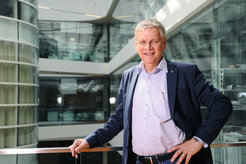The Opportunity of a lifetime
Nils-Göran Larsson will leave the Max Planck Institute for Biology of Ageing and become Professor at the Karolinska Institute in Sweden
After 10 years of excellent research in Cologne, Max Planck Director Nils-Göran Larsson is moving back to Sweden. As Professor and medical doctor, he will continue his research on mitochondrial function and diseases at the Karolinska Institute in Solna, north of Stockholm. The bridge between Cologne and Stockholm, however, will not be broken down. As an external scientific member of the Max Planck Institute for Biology of Ageing, Nils will continue his collaborations and maintain a small research group in Cologne.

“Moving is a good thing in science” says Nils. A new context, new colleagues and a new environment would allow the creation of something new. The scientist moves back to Sweden and simultaneously moves on to new challenges in his career. He will not only continue doing research on mitochondria and their role during cancer but he will also work as a senior consultant and medical doctor diagnosing patients with mitochondrial diseases.
For 30 years Nils-Göran Larsson has been studying an important organelle of our cells – the mitochondria. During his time in Cologne he has highly advanced the understanding of those organelles – how they are regulated, how the molecular machineries work and how mitochondrial DNA is generated, transmitted and inherited. With the help of the Max Planck Society and the Max Planck Lead Discovery Center his group broadened their understanding of mitochondrial transcription culminating in the development of a new drug against cancer, which is currently licensed to a biotech company.
Apart from his scientific achievements Nils will never forget the experience being one of the members founding such a big scientific institute as the Max Planck Institute for Biology of Ageing. “There were three directors in an empty room and we had to start to get everything going” remembers the Swedish scientist when he thinks back to the time in 2008. “It was that pioneering spirit and the opportunity of a life time starting a completely new institute” continues Nils and explains they had to set up the institute from scratch. They especially invested a lot of effort in excellent core facilities, which are constantly helping the scientists to realize their projects since then.
During the past years the Max Planck Institute for Biology of Ageing with its neighboring institutes and collaboration partners has become one of the strongest research institutions in the field of mitochondrial and ageing research. Together with the recently appointed new Director Thomas Langer, Nils established the so-called lecture series “MitoClub” to foster scientific exchange and collaborations in mitochondrial research, in particular between the University of Cologne and the Max Planck Institute.
Moving to Sweden, however, does not mean that Nils will turn his back on Cologne. In contrast he wants to strengthen the already existing bridge between the Karolinska and the Max Planck Institute for Biology of Ageing. In the already existing Max Planck Institute for Biology of Ageing - Karolinska Institute Laboratory (MPI-KI) the basics science of the Max Planck Institute can meld with the practice on patients at the Karolinska Institute. As an external scientific member of the Max Planck Institute for Biology of Ageing Nils will also have the chance to maintain a small research group based in Cologne. “I will visit Cologne on a regular basis. Not only for science but it is also the center of Europe where you can find so much culture and history.”












